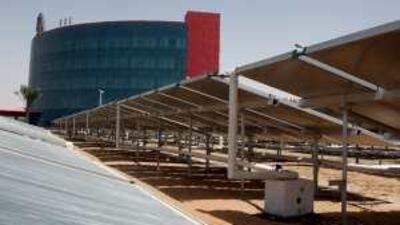Building-design rules to curb the waste of electricity and water will be ready soon, officials said yesterday. The rules are intended to reduce electricity use by 20 per cent and water consumption by 15 per cent. Existing buildings may have to be adapted to make them more energy-efficient.
A final draft of the rules is being reviewed by officials at Dubai Municipality and the Dubai Electricity and Water Authority (Dewa). "We are working day and night to finish it," said Kamal Mohammed Azayem, a mechanical engineering expert at the municipality's building permit section and one of 13 experts reviewing the proposals, which now number about 70. In April last year Tim Armstrong, technical director of WSP Middle East, a consultancy hired to assist the municipality, had said that the aim was to release a draft by the end of the year. But the task was more demanding than initially thought, said Mr Azayem, who was not willing yesterday to commit to a new deadline.
He said that once a final draft was completed, it was subject to review by the Dubai Executive Council. Some details of the proposals emerged yesterday as Mr Azayem addressed an audience at Wetex, a trade show for the power and water industries organised annually by Dewa. The rules are based on what Mr Azayem called "the elemental method", which focuses on specific features within buildings. One example is insulation, which can be used to prevent heat from outside entering buildings, saving power by reducing the need for air conditioning.
Regulations for insulation were issued in 2003, but may be made more stringent. In an earlier interview, Mr Azayem said some buildings in Dubai could be required to use solar power to heat water. Such innovations could be introduced in stages, however. Mr Azayem said the rules had been delayed because of the complexity of the issue and the Government's desire to come up with "a robust document" that would work in practice.
Each of the suggested changes is being evaluated according to its environmental impact, cost to developers and ease of implementation. "Some regulations might need engineers to educate people on how to implement and check them," he said. The market's readiness to adopt the proposed changes was also being looked at, Mr Azayem said. In some cases suppliers had a monopoly on environmentally friendly products and services. "We do not want to put in place a regulation that there is only one supplier for," he said.
The proposals are also being reviewed in light of the economic downturn. The Government does not want rules that would hinder development. Dubai has been developing at a rapid rate. During the 1980s, the total built-up area in the emirate amounted to 25 million square feet, said Mr Azayem. In the 1990s, the figure increased to 281 million square feet, while between 2000 and 2007 it rose to 568 million square feet.
Population growth, coupled with electricity and water use rates that are among the world's highest, have put great pressure on electricity and freshwater production. The emirate's electricity capacity has, meanwhile, also been rapidly increasing. Despite attempts to address Dubai's high consumption rates through such measures as the new building regulations and public campaigns, the Government relies primarily on boosting its generation capacity.
A facility to be built on the coastline near the border with Abu Dhabi will boost the emirate's water and electricity capacity several times. Abu Dhabi is also working on energy-conscious building regulations - the Estidama Sustainability Guidelines. Developed by the Urban Planning Council, the guidelines are a performance rating system and will initially be implemented voluntarily by developers. They are expected to be announced this year.
vtodorova@thenational.ae

